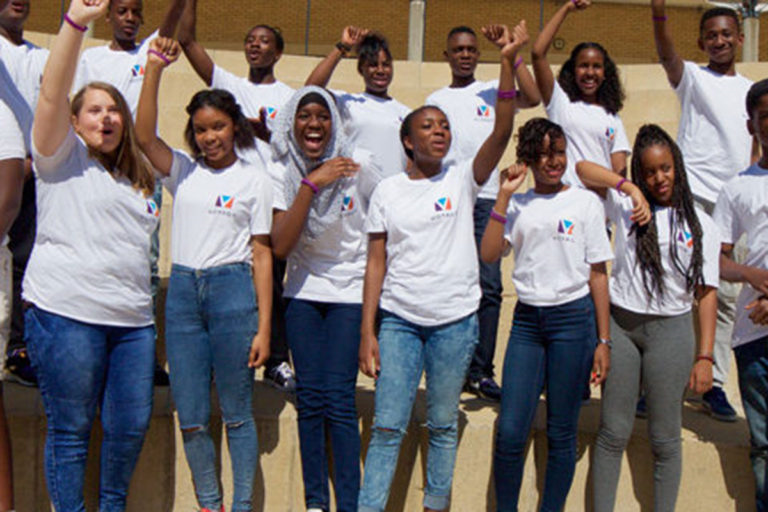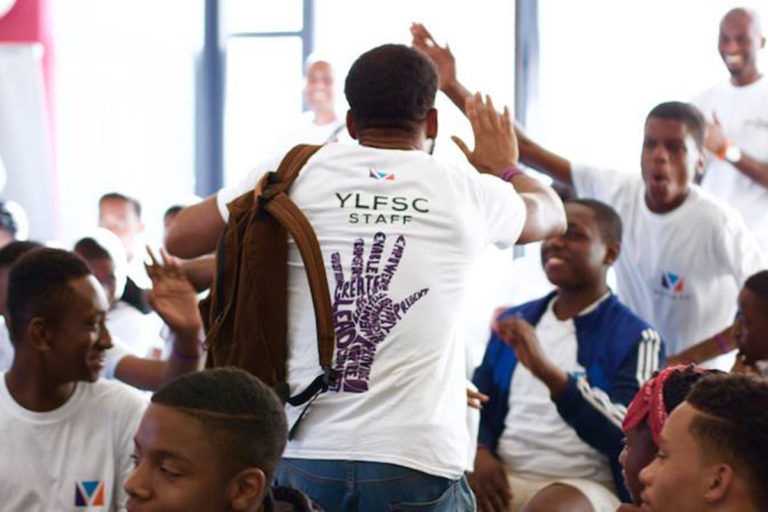Paul Anderson MBE: Respecting young black leaders
The recent rise in violence has made me angry. My answer to how we improve places is influenced by that anger, but also by the optimism that we have built VOYAGE with.
At VOYAGE, we are committed to transforming and developing the opportunities and aspirations of young black communities across London. We are working to create cadres of young leaders who join us to promote lasting peace, respect and equality, ultimately changing the narrative and perception of young black communities.
VOYAGE was formed by the Black Police Association in 1998 in response to the Macpherson Inquiry and its core programmes were formally initiated by the Mayor of London’s Time for Action Strategy 2011. Voyage is perhaps even more relevant now due to the significant increase in the Met Police’s use of stop and search, youth violence and murders across the capital since 2006.
Voyage is driven by a need to reduce sentencing inequalities and some of the negative effects of policing through direct dialogue and engagement with the Met Police, especially as victims and perpetrators of youth violence are under the age of 18. Although crime in general is decreasing, the numbers and the recent spur of gang violence in London tell a story of considerable inequality within young black communities and an even bigger reason to provide more focused youth leadership solutions.

Improving places for these young people
Supporting black and minority ethnic young people to raise their contribution to society (education, employment and civic engagement), is an ongoing challenge, and our work is never done. Whatever the location, a huge part of the answer will always be commitment, dedication and a lot of work. We’ve had many successes over the years, but they have not been easily won. If you really want to improve the ‘place’ and life of our young black communities, I think we need to look at four structural challenges that affect young people’s ability to thrive and prosper. This must be coupled with perhaps the most essential ingredient: respect.
Challenge 1: Flexible funding is not available
We are now in our 8th year of austerity, and with the funding of essential services being cut across the country, funding for anything else – as everyone who relies on this will know – is becoming increasingly harder to come by. The issues of ‘young people’ are not high on the government’s list, so this currently is one of our major hurdles. Lack of funding availability and a lengthy process to apply for funding as well as not always knowing when to apply to avoid missing the boat, all provide huge challenges to enable thriving youth community services and progression opportunities supporting mainstream education.
There’s a need for flexible funding and commissioning which can be drawn upon when surges of crime and violence arise. This would allow youth organisations to extend their opening times and provide a safe space for young people to go to and receive additional support. This would help us and other youth provider to deal with the problems more immediately, not in 6 – 12 months’ time, when it might already be too late. This flexible funding provision currently does not exist, and I think is desperately needed.
Challenge 2: The youth-police relationship
We believe that the relationship between young people and the police in the areas we work is as bad as it’s ever been. I believe this to be down to three problems:
Perception. The reason that the relationship is bad is because there is little, or in most cases no, effort made to build a relationship and sustain the dialogue. I believe this is due to the dichotomy of young people feeling both over policed on the one hand and feeling under protected on the other. This is seen by the significant emphasis on the enforcement as opposed to setting out how the law works which could stop young people falling into crime due to naivety, a random act of bravado or simply just being uninformed. If you ask a young person, they will tell you the Police carry out their duties whilst they lack real knowledge of the community. This all does nothing to improve trust and only serves to significantly increases animosity between both parties.
Strategy. ‘Stop and search’ is the main police strategy that is experienced by young people. There is not enough emphasis on supporting communities, and too much emphasis is placed on the police arresting their way out of the situation rather than using good old dialogue to build trust or using crime prevention as a powerful methodology to promote change. A strategy based on stereotyping and enforcement is failing London and it’s clear to see how this affects young people’s relationship with the law. If we wish to see improvement in this area, we must take a long-term view by involving young people in the development of these strategies, not only to reduce crime but also bring healing to generations of black communities that have little trust or confidence in police.
Communication. There is no direct conversation happening. Many officers do not offer sufficient explanation as to why a person is being stopped and searched (under section 60, anyone who looks suspicious may be stopped). This only fuels their perception of police prejudice and operate like a gang.
The police are also not listening as there are no forums or places for young people to strike up equitable dialogue with the police. To me, it’s clear young people do not feel that they are being heard or that their issues have any legitimacy or importance in the eyes of the police force. Much more resource and energy need to be put in place to start and sustain structured conversations that will help to create policies, procedures and practices that ensure crime continues to reduce but also improves the level of trust and confidence of our youth.
Challenge 3: Providing youth support after violence
There are currently no services in place to support our youth experiencing trauma after a young person is murdered. In an environment where deaths and attacks are commonplace, I find it strange there are no budgets targeted at providing any support to the families and friends of the victims of crime. This leads to more violence and anger and creates communities with significant levels of trauma which only get passed down the generations.
All in all – if you take this anger and mix it with hostile policing and a lack of support services, it leads to a community that can only feel over policed and under protected. This anger, when not addressed, becomes toxic. It passes on to the entire community, filtering down through the generations, leading to a deeply ingrained community grudge and a potentially unsolvable problems.
This is a problem we are working hard to address. At VOYAGE, we are now working with the youth as well as their teachers, parents and the police. We are helping to educate young people in the hope that they educate their peers in turn and that we develop a culture of leadership, hope and inspiration to be better.
But, we are a drop in the ocean. There needs to be a wider effort and emphasis on holistic solutions to this kind of issue. We need to take a closer look at how to deal with trauma, so that this culture of anger does not continue to spread, and that violence does not continue to incite further violence.
Challenge 4: Where can our young people go?
Looking at Hackney in particular, Shoreditch is a hub of regeneration these days. This is great for the general economy of the area, but for many of our young people, these and other regenerated areas are simply too expensive and, therefore, inaccessible. Many of the regenerated buildings were buildings initially built for the community. For example, the Robert Redmond Community Centre was taken over by the council’s housing service, and is no longer accessible, and so is one less place for our young people to go to.
Not only does this mean that young people have nowhere to go, this also sends a message to our youth saying; ‘you are not welcome here’. It only adds to the feeling of rejection that they are already getting from so many other sources. These buildings need to be opened up again and made inclusive and accessible to the whole community. Wasn’t this a gift of local regeneration initiatives we all came to Hackney to support?

What is VOYAGE doing to create change?
We have set up many schemes and resources and instigated a number of relationships in order to tackle these big challenges, empower young black and minority communities and make a positive difference to their lives. Here is a glimpse at what we are doing to create that positive change.
Leadership Programmes. We deliver our five core programmes out of Hackney Community College and we also support students that are failing. All our work streams are geared towards providing inspiration, hope and a sense of worth to the young people in the community. You can find out more about our leadership programmes here.
Working with the Police. We are working closely together with a specialist operation within the police force, the so called “Trident Gang Command”’, a contingent of police officers who follow the gang culture closely and try to understand what is happening on the streets. Voyage views a relationship with this team as essential especially as we are both committed to reducing gang violence and supporting the borough’s young people. We are also making efforts to bring the police and the youth together through Police Round Tables and sustaining dialogue with the IPOC to explore effective and relevant Police complaints procedures.
Police Question Time. In March 2018 we held an event where young people were allowed to question the police. As a result, we are now taking papers and feedback in order to get our youths voices heard, to help them to mould the system.
Improving a place is complex and a long road to walk. Much of the change needed is in policy, procedure and communication, but immediate change can be brought about by simply showing care and compassion. We believe that the change starts with people, with relationships and, most importantly, with kindness.
Hackney has its problems, and yes, the youth community needs work. But the community is committed to creating a better, more compassionate, more peaceful community. We are so blessed to have so many supportive families and organisations on our doorstep. Despite the recent rise in violence, I have no doubt that focussing on the challenges I’ve set out will see things will get better, and am hopeful for the future of our young people.

About the author:
Paul is Chief Executive of VOYAGE Youth. Voyage was established by the Black Police Association Charitable Trust (BPACT) in 2002 and grew to become the education, development and delivery arm of the Metropolitan Black Police Association (MetBPA).
Paul used to work at Renaisi and continues to be based in Hackney.
Twitter: @voyageyouth
